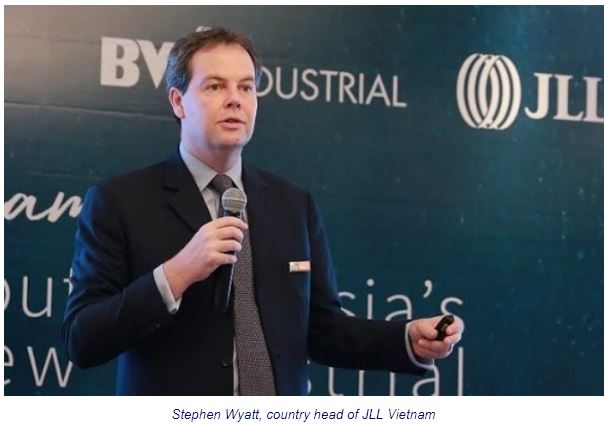FTAs force Vietnam to reform business environment: Experts
Free trade agreements (FTAs), most of which lower tariff barriers, are expected to create more motivation for Vietnam to reform its business environment, according to local and foreign experts.
The Comprehensive and Progressive Agreement for Trans-Pacific Partnership (CPTPP) and the EU- Vietnam Free Trade Agreement (EVFTA) demonstrate Vietnam’s willingness for further international integration, creating new opportunities for the country, said Stephen Wyatt, country head of JLL Vietnam.
In reality, a number of FTAs have largely contributed to Vietnam’s strong economic growth over the past time, said Wyatt, who is from a leading professional services firm that specializes in real estate and investment management.

Deputy Minister of Industry and Trade Tran Quoc Khanh |
Sharing the same view, Deputy Minister of Industry and Trade Tran Quoc Khanh said FTAs are expected to benefit Vietnam in two major aspects namely volume and quality.
It means that regulations stipulated in the FTAs will force Vietnam to change its regulatory framework and improve the business environment.
In addition, the country will get trade expansion, including higher exports to its partners, especially the EU, lifting the economic growth, he added.
Many experts have predicted that Vietnam would be one of few countries benefiting the most from international trade thanks to the dynamics of global value chains. Indeed, Vietnam attained an economic growth rate of 6.7% in 2018 and fulfilled macroeconomic targets in the year.
But Vietnam should make full use of opportunities offered by FTAs.

Vu Tien Loc, head of Vietnam Chamber of Commerce and Industry (VCCI) |
Vietnam can only tap potential from the global trade if the economy makes progress itself but not totally depends on outside factors, said Vu Tien Loc, president of the Vietnam Chamber of Commerce and Industry (VCCI). It means that it’s important to change the regulatory framework to be in line with international regulations.
To be clear, the more Vietnam changes its legal framework, the better integration into the global trade it makes.
In terms of state management, it requires a better business environment which both demonstrates Vietnam’s commitments to the global treaties and enables businesses to grasp opportunities.
Local firms, meanwhile, need to change the corporate governance as it provides the framework for attaining a company’s objectives and encompasses practically every sphere of management, from action plans and internal controls to performance measurement and corporate disclosure.
EVFTA – the bonanza for Vietnam
The EVFTA is considered a breakthrough for Vietnam thanks to the benefits it will bring about, but challenges remain ahead, according to Dr. Dinh Truong Hinh.
Advantages: EVFTA would help Vietnam expand its export market to a broader zone which account for 15% of the world’s market, reduce the prices of home appliances in the Vietnamese market, boost foreign direct investment (FDI) and production, and change legal framework including rules and transparency, Hinh said in an article posted on BBC.
Challenges: Big European firms would increase control of the Vietnamese market; Vietnam’s goods must pass requirements on health protection, environment, and intellectual property before reaching European customers; Vietnam is ineligible to support its companies, unlike the ways which Japan, South Korea, and Singapore (three countries in Asia that have FTAs with the EU) were allowed to do before.
What should Vietnam do?
To make full use of the opportunities, Vietnam needs to encourage private firms to raise productivity by partnering with its peers or foreign-invested enterprises (FIEs) and by raising hi-tech proportion, Hinh has suggested.
If the companies fail to connect one another, the final products would be less value-added due to less knowledge sharing.
In addition, the government needs to reduce the role of state-owned enterprises (SOEs); to treat all business fair, mostly direct and indirect exporters; to boost the development of clusters; to invest more in plug-and-play industrial parks and hi-tech parks; to encourage business partnership through sub-contracts; to incentivize foreign investment in upstream and downstream projects; to encourage the partnership between FIEs and domestic businesses through joint ventures; and to develop social relations and relationship with foreign partners.


 English
English




